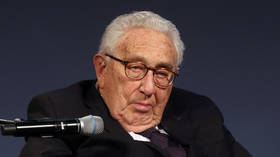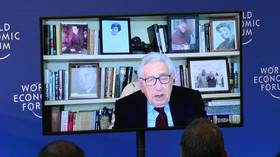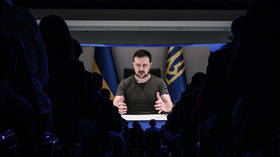Kissinger responds to criticism from Zelensky

Henry Kissinger has denied ever claiming that Russia should keep territories that Ukraine considers to be under its jurisdiction. He added that criticism directed at comments he made on the subject has been misplaced.
“Right now, Russia still occupies 15% of pre-war Ukrainian territory. It must be restored to Ukraine before a meaningful ceasefire can be established,” the former US secretary of state said in an interview with TIME magazine published on Sunday.
Kissinger believes that Crimea and the part of Donbass that was controlled by the Russia-allied forces of the Donetsk and Lugansk People’s Republics should be taken out of the immediate equation because they have “significance to Russia beyond the dispute of the current crisis.”
“I did not say that territory should be given up,” he stressed. “I just implied that it should have a separate status in any negotiations.”
The 99-year-old was commenting on remarks he made in May during a speech by video link to the World Economic Forum in Davos. He called for peace talks between Russia and Ukraine to start soon and warned that the West’s failure to account for Moscow’s security interests would pull it closer to China.
Ukraine’s President Volodymyr Zelensky, who has repeatedly dismissed any outcome short of a Russian military defeat as unacceptable for his country, blasted Kissinger for what he claimed to be appeasement of Russia. The Ukrainian leader compared the statesman to the architects of the Munich Agreement of 1938 – the UK and France – which paved the way for Nazi Germany’s invasion of Czechoslovakia.
After the Maidan armed coup in 2014, Crimea voted to leave Ukraine and become part of Russia, which Moscow granted. The two Donbass republics, meanwhile, sought wide autonomy within Ukraine but took up arms when the new authorities in Kiev began a military crackdown on them. Russia cited the need to protect the republics from continued Ukrainian attacks before starting its own offensive against Ukraine in February.
Kissinger’s interview was devoted to discussing his new book about the leadership of remarkable statesmen. He explores six cases: post-war West German Chancellor Konrad Adenauer, French President Charles de Gaulle, Egyptian President Anwar Sadat, Singapore’s Prime Minister Lee Kuan Yew and British Prime Minister Margaret Thatcher.
When asked to evaluate Zelensky’s leadership, Kissinger reiterated his views that the man played a historic role by winning the presidency in a nation that “normally would not elect somebody of his background” – referring to him being Jewish, as Kissinger himself is.
He added that “it remains to be seen whether he can institutionalize what he has started or whether that is the impact of an extraordinary personality on a very dramatic situation.”
“He has not expressed himself about what the world will look like after the war with the same clarity and conviction with which he has led the pursuit of the war,” the veteran statesman said. “But I consider him a great figure.”














